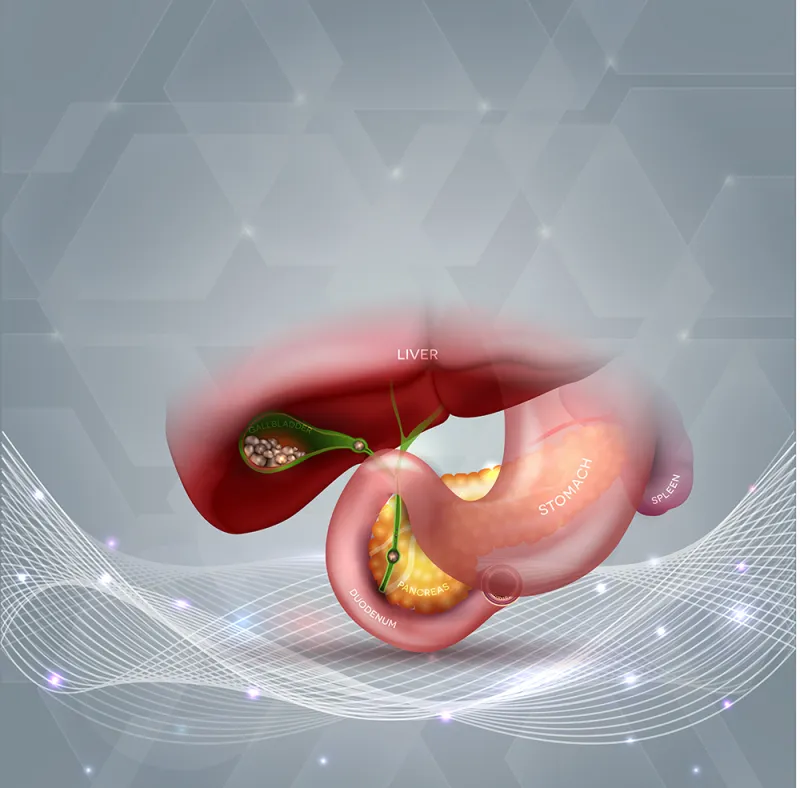You took the plunge and decided to go keto. Then you learned to combine keto with intermittent fasting to enhance your results of weight loss, more energy, and sharper mental clarity.
But a friend mentioned to you that she’d heard fasting causes gallstones.
Gallstones? Aren’t they really painful? That’s no good! Maybe you should rethink this whole fasting lifestyle thing.
Not so fast…
Instead, let’s set the record straight about whether intermittent fasting causes gallstones.
In this article: –
- What Causes Gallstones
- Gallstones Can Be Serious
- How To Decrease Your Risk Of Gallstones
- Intermittent fasting doesn’t cause gallstones

It’s Important To Understand What Causes Gallstones
The first thing for you to understand is what gallstones are, and what causes them.
Gallstones are hardened deposits of a digestive fluid called bile, which is stored in your gallbladder after bile is made in your liver. Your gallbladder is a small organ on the right side of your abdomen, just beneath your liver.
The bile is concentrated in your gall bladder, which makes the bile quite powerful. Its role is to break down and extract nutrients from the fat in your diet after it’s released into the small intestine. This is normal; therefore, despite what many people believe, it’s not concentrated bile that results in gallstones. Rather, it’s a lack of bile that causes gallstones.
That’s why you need to eat in a way that makes your body produce enough bile to keep you from getting gallstones.
One primary trigger for your body to make bile is eating saturated fats. That’s why people who go on a low saturated-fats diet end up getting gallstones. They don’t have enough stimulation of bile production. Same for people with diabetes, who eat frequent meals, or who eat a high carbohydrate diet – all of these circumstances deplete bile production and impact the gall bladder’s healthy function.
But are gallstones a health problem or are they more of a nuisance?
Gallstones Can Be Serious
Interestingly, gallstones can cause no symptoms. Or, a gallstone attack can be very painful. If a gallstone lodges in a bile duct of your gall bladder and causes a blockage, you may experience:
- Sudden and quickly increasing pain in the upper right portion of your abdomen
- Sudden and quickly increasing pain in the center of your abdomen
- Back pain between your shoulder blades
- Pain in your right shoulder
- Nausea or vomiting
Gallstone pain may last several minutes to a few hours. And In rare instances, you may experience serious gallstone complications leading to gallbladder disease such as:
- Abdominal pain so intense and prolonged that you can’t sit still or find a comfortable position
- Jaundice, which results in yellowing of your skin and the whites of your eyes
- High fever with chills
Seek immediate medical help if you have any of these symptoms.
You can see it’s definitely best for your health to take steps to keep gallstones from forming, rather than risk getting them.
How To Decrease Your Risk Of Gallstones
When you go on the high fat Healthy KetoTM diet, you increase your healthy fat intake, resulting in increased bile production – which will lessen your chances of forming gallstones.
Healthy fats include olive oil, coconut oil, grass-fed butter, and nuts such as almonds and macadamia nuts. Your keto diet should consist of 20-40 grams of good fat per meal, along with an unlimited amount of vegetables.
Then, when you add Intermittent fasting, this allows your body to produce and concentrate more bile. Intermittent fasting is simply a pattern of eating and not eating on a deliberate schedule; a common pattern is 16 hours fasting and 8 hours eating window, known as 16:8.

When you fast, your liver continues to produce bile, but your gallbladder doesn’t release it; allowing the bile to become very concentrated. And as I’ve mentioned, concentrated bile further decreases your risk of forming gallstones yet is availabe to digest the fats you consume when you resume eating.
Together, keto and intermittent fasting will help keep your gallbladder healthy and go a long way toward prevention of gallstones.
The Answer About Intermittent Fasting Causing Gallstones Is Clear
Clearly, the answer is no: intermittent fasting doesn’t cause gallstones. Happily, there’s no need to worry that you’re risking gallstones and perhaps potential damage to your health.
Now that I’ve explained what increases your chances of getting gallstones, you can be reassured that intermittent fasting along with keto promotes a healthy gallbladder.
And of course, there are numerous benefits to adopting a keto and intermittent fasting way of life: weight loss, increased energy, and improved mental clarity. Take a look at the keto before and after reviews then come join the ranks of people who’ve had success improving their lives with intermittent fasting and keto.
Up Next: –
Disclaimer: Our educational content is not meant or intended for medical advice or treatment.Editor’s Note: This post has been updated for quality and relevancy.







